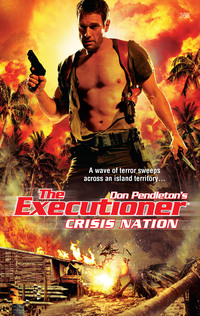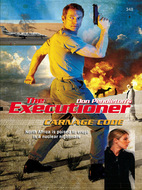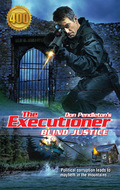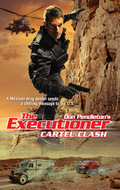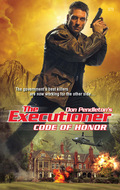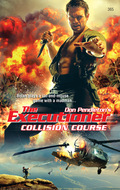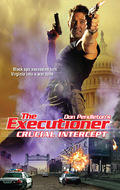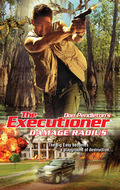Das Buch kann nicht als Datei heruntergeladen werden, kann aber in unserer App oder online auf der Website gelesen werden.
Buch lesen: "Crisis Nation"
“Everybody down!” the Executioner shouted
The machine gun outside slammed into life like doomsday. The wooden walls of the museum were no defense against the cigar-sized bullets that passed through them like they were paper. Glass display cases shattered in explosions of shrapnel shards. Juanita was the only one to have disobeyed Bolan, and she paid for it as a burst from the crew outside sacrificed her to the revolution. The machine gun outside slammed into life like doomsday. The wooden walls of the museum were no defense against the cigar-sized bullets that passed through them like they were paper. Glass display cases shattered in explosions of shrapnel shards. Juanita was the only one to have disobeyed Bolan, and she paid for it as a burst from the crew outside sacrificed her to the revolution.
Bolan glanced at the Beretta in his hand. They were definitely outgunned.
The weapon outside suddenly fell silent as it burned up its one-hundred-round belt. The crackle and pop of small-arms fire filled the gap as the machine-gun crew reloaded. Bolan rose to a crouch. It was time to move. “Everyone behind me!” he shouted.
The Executioner threw himself down again as he heard an unmistakable sound and the real hell-storm began.
Six-foot streaks of fire geysered through the hundred machine-gun holes perforating the museum walls. Somebody had brought along a flamethrower. They were upping the ante.
Crisis Nation
The Executioner®
Don Pendleton

When you are occupying a position which the enemy threatens to surround, collect all your force immediately, and menace him with an offensive movement.
—Napoleon I
1769–1821
Maxims of War
When my enemy thinks I am surrounded and have no way out, I will take the opportunity to make my own attack.
—Mack Bolan
THE MACK BOLAN LEGEND
Nothing less than a war could have fashioned the destiny of the man called Mack Bolan. Bolan earned the Executioner title in the jungle hell of Vietnam.
But this soldier also wore another name—Sergeant Mercy. He was so tagged because of the compassion he showed to wounded comrades-in-arms and Vietnamese civilians.
Mack Bolan’s second tour of duty ended prematurely when he was given emergency leave to return home and bury his family, victims of the Mob. Then he declared a one-man war against the Mafia.
He confronted the Families head-on from coast to coast, and soon a hope of victory began to appear. But Bolan had broken society’s every rule. That same society started gunning for this elusive warrior—to no avail.
So Bolan was offered amnesty to work within the system against terrorism. This time, as an employee of Uncle Sam, Bolan became Colonel John Phoenix. With a command center at Stony Man Farm in Virginia, he and his new allies—Able Team and Phoenix Force—waged relentless war on a new adversary: the KGB.
But when his one true love, April Rose, died at the hands of the Soviet terror machine, Bolan severed all ties with Establishment authority.
Now, after a lengthy lone-wolf struggle and much soul-searching, the Executioner has agreed to enter an “arm’s-length” alliance with his government once more, reserving the right to pursue personal missions in his Everlasting War.
Contents
Chapter 1
Chapter 2
Chapter 3
Chapter 4
Chapter 5
Chapter 6
Chapter 7
Chapter 8
Chapter 9
Chapter 10
Chapter 11
Chapter 12
Chapter 13
Chapter 14
Chapter 15
Chapter 16
Chapter 17
Chapter 18
Chapter 19
Chapter 20
1
Laguna San José, Puerto Rico
Bolan stared at the three stripped bodies as they bobbed in the shallow water. They had bloated up from being in the salt marsh overnight. Bruises encircling the wrists and ankles showed that the two policemen and one policewoman had been bound. Brutal contusions on other parts of the policewoman’s body showed that she had endured other abuses before she had been decapitated with her fellow officers. San Juan CSI had marked off the area with stakes in the silt wrapped with crime-scene tape. It was impossible to get a car down there in the mud, so a harbor patrol fan boat was making its way through the reeds. Bolan glanced up as a passenger jet roared out of Luis Muñoz Marin International Airport across the lagoon. Heat shimmered off the causeway loaded with morning traffic crossing the shallow waters. At nine o’clock in the morning, it was already ninety degrees. He glanced back at the bodies. It was getting to the point that the police no longer waited to be called. Every morning harbor patrol sent out small boats to the lagoon and more often than not they came back with bodies.
“This is bad, Señor Cooper,” Inspector Noah Constante said, using Mack Bolan’s cover name for this mission. He was a lanky man in a television-blue guayabera shirt and a white Kangol driving cap. He had a coppery complexion, a hooked nose and slightly almond-shaped eyes that spoke of indigenous Taino Indian blood. A pencil-thin mustache completed his look. With the Colt .45 pistol automatic tucked into the front of his tropical white silk pants, he looked like the world’s most dangerous golf caddy. He lit another cigarette and tossed the old butt into the water. “Very bad.”
Bolan nodded. Beheading was a favorite of method of “warning murder” with the Mexican drug gangs, and it was quickly becoming popular throughout Central and South America. To Bolan’s knowledge this was the first time it had been used by political revolutionaries in the Caribbean, much less in a commonwealth of the United States.
Much less against United States military police personnel.
Puerto Rico’s political status was unusual to say the least. It was currently considered an “enhanced commonwealth” of the United States and its politics were split fairly evenly along three diverging lines. There were those who wanted to maintain the status quo, and they had won referendums to keep it that way in six decades of votes on the subject. There were those who wanted Puerto Rico to become the fifty-first state of the United States and join the republic.
And there had always been a Puerto Rican independence movement.
Since the 1800s there had been those who had wanted to kick out the Spanish colonizers. When the United States had invaded the island during the Spanish-American War, there had been those who had wanted to kick out the Yanquis. That had been mollified a great deal when Harry S Truman gave all Puerto Ricans American citizenship. Still, there had always been those who sought, and sometimes fought, to gain nation-status for the Caribbean island. The Nationalistas were the smallest of the three political affiliations, but they had always been the most vocal.
They had also been the one to turn to violence.
Until recently it had always been small-scale, and most of even the most ardent of those who dreamed of Puerto Rican independence shunned violence as a means to achieve it. Now, times seemed to be changing. It had begun with rumors that the U.S. military was storing nuclear weapons on the island. Political activists had begun protesting outside U.S. military bases and Puerto Rican police stations. The actions by military policemen to round them up and take them away from the bases had made news worldwide. When a protestor had been shot trying to break into Fort Buchanan, the protests had broken out into street-rioting in the capital. Tear gas and rubber bullets had been used and the rioting and looting had gotten worse.
Then people had started to die in earnest.
Anyone who opposed the closing of the bases or independence for Puerto Rico was branded a traitor. There had been a number of high-profile kidnappings, and street violence disguised as political statement had become endemic in the capital and was spilling out into the countryside. Police had become a popular target, and it was common knowledge that many Puerto Rican police were sympathetic and were not prosecuting or investigating to the best of their abilities. The United States was loath to send in armed troops or hordes of federal police. The Puerto Rican governor had called out the National Guard, and many of them were very reluctant to take action against rioters or demonstrators. Many had thrown down their weapons and joined them.
There were many in the U.S. congress and senate who believed that the U.S. should wash its hands and let the island commonwealth go. The FBI had very strong leads that Puerto Rican organized crime had a very strong hand in everything going on, but when a car bomb had gone off outside their San Juan office and two of their agents had been killed, they had been forced to admit there wasn’t much they could do about it without massive reinforcement.
Puerto Rico was turning into a powder keg, and it was almost to the point of being a “retake the island or let it go” situation. The President was willing to consider Puerto Rican independence, but had stated categorically to his cabinet he would not allow the U.S. and Puerto Rico’s long association to be severed by the sword of domestic terrorism rather than the ballot box.
He was unwilling to send in the 101st Airborne Division. Instead he fell back on the services of a patriotic American.
Mack Bolan had boarded a plane.
He turned and sized up the man beside him. Puerto Rico might be a commonwealth of the United States, but it was also a Caribbean island with an overwhelmingly Latin culture. Corruption among the police was endemic. Inspector Noah Constante had a reputation as an ass-kicker. He had a lot of arrests, a lot of convictions and a sleepy aura of relaxed violence about him. Bolan suspected that if Constante had been a cop on the mainland he would probably have been brought up on police brutality charges dozens of times. He was a man who got things done and specialized in homicide. That told Bolan that if Constante was corrupt, the inspector was much more likely to receive favors and bribes from local businessmen and politicians rather than criminals. That was one reason why Bolan had requested him.
“Beheadings say gangsters. I think gangsters did this,” Bolan said.
“Well,” Constante said, giving a very Latin shrug, “there is no reason why a man cannot be a gangster and a patriot.”
Bolan tilted his head at the bodies. “You consider whoever did that a patriot?”
“Whoever did that is murdering, rapist scum.” Constante’s black eyes stared long and hard at the dead military policewoman’s corpse. “I happened to have known Miss Corporal Carson. She was a good cop. I am afraid I cannot let this stand.”
“So tell me, who’s the most powerful gang in Puerto Rico?” Bolan knew the answer, but he wanted to gauge Constante.
“That’s easy.” The inspector shrugged again. “That would be La Neta, which means the truth. They formed in Río Piedras Prison in 1970, supposedly to stop violence between inmates and promote solidarity between the Puerto Rican gangs, but they have since, how would you say…evolved, beyond their original charter.”
“What else can you tell me about them?” Bolan asked.
“They often promote themselves as a cultural group. Since their inception they have always promoted independence for the island. Like all successful prison gangs, they spread out beyond the prison walls. They have taken over many of the street gangs and established ties with others. They have always had a reputation of silencio.”
Bolan raised an eyebrow. “Silence?”
Constante frowned. “Not exactly.” The inspector sought for a translation. “It is not the word they would use, but you would understand their reputation much more as tranquilidad.”
“Quiet,” Bolan said.
“Yes, quiet. Make no mistake, La Neta is a violent street gang. Disrespect or action taken against one of their members or affiliates is seen as an attack on all members, and they will violently defend their turf. However, they have established the unusual tactic of not drawing attention to themselves, and when they do, it is as a patriotic organization—Puerto Rico for Puerto Ricans. Often they put money into their local barrios, in community projects. They will provide beer and food at fiestas and march in parades wrapped in the Puerto Rican flags. They let other gangs draw attention to themselves as gangsters, they let others establish reputations for violence and killings, for being bad men, and when the inevitable crackdown comes? La Neta is waiting, in silencio, to move in and take over their turf or swallow up their organization.”
Bolan eyed the inspector shrewdly. “What about ties to political groups?”
“As I have said, señor, La Neta is strongly patriotic. They have long associated themselves with the Los Macheteros revolutionary group.”
Bolan had read a dossier on “The Machete Men.” For years they had been on the violent, extremist end of the independence movement. Bolan surveyed the headless corpses. “That look like machete work to you?”
“Indeed.” Constante sighed. “However, I must say that is a tenuous, indeed, metaphoric lead at best.”
The inspector had a bit of the poet about him. Bolan found himself liking the man but not immediately trusting him. “Like I said, this looks like gangster work, parading as politics, and that’s where I’m going to start my way up the food chain.”
“You know much about gangsters, then?”
Bolan played a card and posed a question of his own. “Tell me, Inspector, did you ever see the movie The Untouchables?”
“‘They pull a knife, you pull a gun. He sends one of yours to the hospital, you send one of his to the morgue.’” Constante quoted. His teeth were neither particularly even nor straight, but they flashed blindingly white out of his face.
“And there endeth the lesson,” Bolan concluded. “You in?”
“Oh, well, how may I be of assistance to…” He gazed at Bolan in open, smiling suspicion. “The United States Department of Justice?”
Bolan and Constante understood each other. The soldier had been sent under the umbrella of the United States Department of Justice as Agent Matthew Cooper, a DOJ “observer” of the current political crisis. However, if that were true he would be spending his time with diplomats, politicians and lawyers rather than standing ankle-deep in the silt of the Laguna San José with a lowly homicide inspector. The title and the job description were phony and both men knew it. All Constante knew was that the Man had come to his island, and apparently the inspector thought it was about time.
“Give me a name,” Bolan said.
“What kind of name, señor?” The inspector asked innocently.
“Why, the name of the worst son of a bitch in San Juan.”
“Oh!” Constante brightened. “That is easy. The name you want is Yotuel d’Nico.”
“I think I’ll go have a talk with this Yotuel.”
Constante grinned happily. “I will light a candle for you.”
2
“So who’s this Yotuel, anyway?” Bolan asked.
The bar stools around Bolan emptied as if he were radioactive. The bartender was short, fat, potbellied, bald and missing his front teeth. He also had a cursive letter N for La Neta tattooed on the back of his hand between his right thumb and forefinger. He looked Bolan up and down and leaned in close. “Hey, gringo, why don’t you finish your beer and fuck off?”
Bolan finished his beer and ignored the invitation. “I mean, is he some kind of tough son of a bitch or something?”
The bartender elaborately washed his hands in the sink and muttered, “You dig your own grave” under his breath in Spanish.
“All the way to China, baby,” agreed Bolan. He pushed his empty mug forward for another.
Strangely enough the bartender began refilling Bolan’s glass. He smiled without an ounce of warmth. “Did you say…baby?”
“You bet your ass,” Bolan agreed.
“You should be careful of using that word in this place. Bebito Jesus might be listening.”
Bolan took the bait and the refilled mug. “We all have a friend in little baby Jesus.”
“No.” The bartender kept on smiling. “Not you, my friend.”
There was no mirror behind the bar. Bolan had been aware of people in the dark booths in the back, and he had heard someone walking up behind him. He was somewhat surprised to find himself suddenly in shadow as if there were a solar eclipse in the barroom. Bolan swiveled his bar stool and behind him was Bebito Jesus.
There was nothing little nor Christlike about the behemoth looming over him. The man had to have topped six-foot ten, and his frame was sheathed in sumo-wrestler-sized rolls of fat. He looked like a cartoon character, but there was nothing funny about the look in his eye or the bass rumble of his voice. “Fuck you.”
Bolan blew the froth off the top of his mug, and it slopped onto the giant’s sandaled feet. He raised his mug in toast. “And your mother.”
Bebito blinked. It was perhaps the first time anyone had said that to him in his life. Bolan didn’t underestimate his opponent, but the Puerto Rican, on the other hand, seemed to be fatally underestimating Bolan. He slowly reached out with one spatulate hand and gathered up the front of the big American’s shirt in his fist and began lifting him out of his seat. Bolan rose and snapped the stacked leather heel of his dress shoe down into his adversary’s left big toe. Bebito’s shoulders cringed and his eyes went blank with the sudden shock. Bolan took the opportunity to stomp down again and break his other big toe. Bebito gasped and stooped toward his pain. This brought his face on par with Bolan’s. The Executioner snapped his forehead forward and shattered Bebito’s cheekbone. The man’s eyes rolled back in his head.
The behemoth toppled backward. Bolan sat back down at the bar. He hadn’t spilled a drop of beer. “So, what were we talking about? Oh, yeah, well, you know? They call this Yotuel guy the Lion but he sounds like a real pussy to me.”
“Mister…” The bartender stared at Bolan in almost total incomprehension. “You’d better leave.”
“Yeah.” Bolan put down his beer mug and dropped a twenty on the bar. “Tell this Lion freak I’ll be back tomorrow, same time.”
Bolan walked out into the street. Constante still leaned against the front fender of his black, unmarked Crown Victoria police car. This was one of the most dangerous neighborhoods in San Juan and the lanky inspector ate a Cuban sandwich and drank a Budweiser tall boy from a six-pack sitting on the hood like he owned the place. “Did you speak to Yotuel?”
“No, but I stepped on a few of the right toes,” Bolan answered.
“I heard a crash. I almost came in.”
“I ran into Bebito.”
Constante started in surprise. He clearly knew the giant. “Bebito Jesus? What happened?”
Bolan shrugged. “That was the crash.”
The inspector was impressed. “He assaulted you?”
“It didn’t get that far.”
The inspector looked sidelong at Bolan. “Is he dead?”
“No, but he needs to go see his podiatrist.”
“Ah, well, it begins.” Constante sighed happily.
BOLAN AND THE INSPECTOR drove through the night. The violent street protests of the day had given way to candlelit vigils in the plazas. Puerto Rican rock bands and rappers played freedom benefits. Professors and students made dramatic oratory. The guitar playing, speech making and talk over megaphones of a greater Puerto Rico were counterpointed by the darkened and looted storefronts and the smoldering and burning cars on the streets. The inspector had driven to a number of bars and spoken to informants. Bolan had not been privy to the conversations nor had he inquired. Right now it was Constante’s play.
“Well, amigo, I will tell you.” The inspector turned to him now. “It appears that Yotuel is very angry with you.”
“So I would imagine,” Bolan admitted.
“He is also aware that I was standing outside the bar while you impugned his reputation and destroyed his enforcer in insulting fashion.” The inspector paused and then said, “I gather you are armed?”
Bolan had full war loads at the DOJ building, three safe-houses and every military base on the island. He tapped the Smith & Wesson Centennial revolver in a cross-draw holster beneath his shirt. A lightweight titanium model of the same gun rode in an ankle holster. He simply said, “I have a gun.”
“Well, I think it is going to be a bad night in old San Juan, amigo. Would you like to get a bigger gun? I think I would like a bigger gun myself.”
“I’m your humble servant in all things,” Bolan said.
Constante spit the stub of his cigarette out the window and punched the cigarette lighter on the console. “I suspect the opposite it true.” He took the car back toward the capital police building and pulled into the underground parking lot. Men in uniform and plain clothes nodded at Constante as they went through a series of basement catacombs and finally came to a room with a counter guarded by thick bulletproof glass. The man behind the glass looked like an accountant except that the forearms revealed by his rolled-up sleeves were built like bowling pins and his fingernails were blackened by accumulated gun grease that would take industrial solvents to clean away.
“Mono!” The inspector grinned at the armorer. “I need guns!”
Mono turned a measuring eye on Bolan and then sighed in amusement at Constante. “Flaco Ordones was here. He already checked out the BAR. He said it was on your authorization.” Flaco was Spanish slang for skinny. BAR was the U.S. military acronym for Browning Automatic Rifle. It seemed the inspector was serious about getting bigger guns.
Mono shook his head. “You know, Inspector, strictly speaking, only the SWAT team can check out weapons without clearance from above.”
The inspector lit another cigarette and one for Mono as well. He sighed and blew smoke into the ceiling light. “You know something, Cooper? There was a time when a Puerto Rican cop could get anything he needed just by asking. Of course, there was always very little to be had…but you could get it.”
Bolan nodded sympathetically. Inspector Constante was an old-school Puerto Rican cop. He came from a lineage that kicked doors, cracked heads and squeezed suspects. As Puerto Rico modernized, his day was swiftly coming to a close.
Constante warmed to his subject. “Now it is all forms, subcommittees, review boards, and, Heavenly Father help us, after-action reports.” He turned on the armorer. “Are you going to make me fill out forms in triplicate, Mono? Do I need to form a subcommittee to recommend my course of action?”
Mono regarded Constante drily. “Might I inquire as to what your course of action may be?”
“Oh, is that all?” Constante nodded toward Bolan. “Me and the gringo are going to clean up Puerto Rico. He already started with the Taino bar. Apparently he used Bebito as a mop.”
Mono blinked at Bolan several times. “You will need guns.” The armorer turned back to his racks and workbenches and came back with a pair of ancient and cracked leather violin cases. Inspector Constante opened one of the cases and stared lovingly at the contents. “You know, my friend, Puerto Rico has always been the United States’ poor little cousin. I, myself, as a young man, was in the Puerto Rican National Guard. We did not receive M-16 rifles and M-60 machine guns. We received WWII Garand rifles, Browning Automatic Rifles, military surplus. I was Military Police, and my unit received Thompson submachine guns.”
Constante racked the action. The wooden stock was dinged and stained and much of the weapon’s gunmetal blue finish was missing, but the action racked as slick as oil on glass and bespoke Mono’s faithful maintenance. Constante ran a fond hand over the ancient weapon. “You know it?”
Bolan had found a Tommy gun in his hand a surprising number of times. “I’m familiar with it.”
“I believe you are.” He nodded at the other case and Bolan examined the weapon. “How many spare magazines would you like?”
Bolan loaded the weapon, racked it and flicked on the safety. “How about eighteen?”
“In the army we were generally issued nine.”
“How many street soldiers can d’Nico call on?” Bolan countered.
“Hundreds. Do you intend to take on all of La Neta by yourself?”
“No, just select elements of it, and with your help,” Bolan said.
Constante turned to the armorer. “Mono, thirty-six magazines, if you don’t mind, and enough ammunition to load all of them, as well as some spare boxes.”
Mono raised his eyebrows slightly at the request and retreated back into his catacombs. Constante put his weapon back in its case. “Where are you staying?”
“I’m renting a house in La Perla.”
The inspector made a face. La Perla was one of the worst slums in San Juan and ruthlessly ruled by gang culture. “You taunt the Lion, then you climb into his jaws.”
“Well, you know how they say you should keep your enemies close.”
“They do not say you should move in next to them,” Constante scowled.
“I don’t think I’ll be staying long.”
Mono brought them their ammo and they walked out without filling any forms. As they walked back to the parking garage, Constante began speaking quietly. “You know? It is hard to be a policeman in Puerto Rico.”
Bolan nodded. It was a little known fact that perhaps other than Mexico City or Moscow there was no more dangerous place to be a police officer.
Most Americans had no idea of how bad it was. If Americans thought of their commonwealth neighbor in the Caribbean, they thought of blue water, golden sand and partying. It was a common vacation destination for East Coasters and an alternative honeymoon spot.
For the people who lived there violence was endemic. Since the rise of the cocaine trade in the 1980s the island had become a major transshipment point for Colombian cocaine and increasingly a heroin funnel. The Puerto Rican gang and crime cultures had risen with them. People on the island made roughly a third of the average income of the poorest mainland states, and it was reflected in their police force. They were ill-equipped and understaffed, and corruption in the force was as endemic as the violence in the streets.
“You intend to go against the crime gangs and the revolutionaries?” the inspector asked.
“I do.”
“I am ashamed to admit it, but there are those within the force who support what is happening, not out of patriotic sentiment, but because they know if we become an independent nation the potential for profit in bribery will skyrocket. The drug dealers and the gangs know this as well and are already lining pockets,” the inspector said.
Bolan suspected nothing less.
“You will need a force of cops who cannot be corrupted or bought. Those who will not be afraid to bend rules, if not break them outright,” Constante concluded.
“It’d be helpful,” Bolan said.
Constante gestured at his car and the woman leaning against it. “Then behold your second recruit.”
The woman turned. She was short, redheaded, darkly tanned with broad shoulders and an eye-popping bust line that was barely restrained by a blue T-shirt. A corset-thin waist cut what would have been a blocky figure into an hourglass.
“May I present Detective Guistina Gustolallo. She works Vice.”
Bolan could have guessed that. He also noted the Mossberg 12-gauge semi-automatic shotgun crooked in one elbow like she was about to go duck hunting. Her dark eyes looked Bolan up and down in open suspicion. “Yo, Vincente.” The detective popped her gum. “Who’s the gringo?”
“Why, he is the man who put Bebito in the hospital and called Yotuel d’Nico a puto.”
Bolan held out his hand. “Nice to meet you, Detective.”
“Detective…” The woman ignored Bolan’s hand and rose up on her toes to kiss Bolan on both cheeks Latin style. “People I like call me Gustolallo. And you, Blue Eyes, qualify.”
Constante lit another cigarette. “Where is Roldan?”
The woman shrugged. “Roldan is off duty in an hour. Ordones said to call him when you need him.”
“Tell them to meet us in La Perla.” Constante turned to Bolan. “Give her the address.”
Bolan gave it to her, and Detective Gustolallo began speaking rapid-fire Spanish into her cell phone. They piled into Constante’s car and headed down toward the water. La Perla was anything but “The Pearl” of metropolitan San Juan. Beneath the four-hundred-year-old walls and turrets of the fortifications built by the Spanish explorer Ponce de Leon, shacks and hovels leaned against one another. Even at this late hour stick-thin children wandered around in rags and picked at piles of garbage right next to feral dogs. Other piles of garbage burned or were being burned in the hovels for fuel. La Perla was just about the worst barrio in San Juan.
Inspector Constante’s shiny black Crown Victoria was clearly an anomaly. Bolan noticed cell phones in the hands of some of the children marking them as runners for the local drug dealers. They watched the black Ford with wary eyes and punched presets as they drifted back into the shadows. A trio of transvestite prostitutes made catcalls and a few improbable offers at the car and then grabbed their phones once it passed. La Perla’s grapevine was lighting up.
“We’re about to get hit,” Bolan opined.
“Oh, undoubtedly,” the inspector agreed. “I gather you made no attempt at subtlety when you moved in to the neighborhood.
“None whatsoever,” Bolan admitted.
Gustolallo popped her gum in the back seat and the safety on her shotgun clicked off.
Bolan saw a pair of headlights suddenly light up an alley ahead. “Here it comes.”
Die kostenlose Leseprobe ist beendet.
